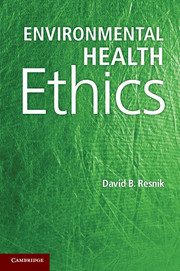Book contents
- Frontmatter
- Contents
- Figures and Tables
- Acknowledgments
- Abbreviations
- 1 Introduction
- 2 An Overview of Environmental Health
- 3 Ethical Theory
- 4 Toward an Environmental Health Ethics
- 5 Pest Control
- 6 Genetic Engineering, Food, and Nutrition
- 7 Pollution and Waste
- 8 The Built Environment
- 9 Climate Change, Energy, and Population
- 10 Justice and Environmental Health
- 11 Environmental health Research Involving Human Participants
- 12 Conclusion
- References
- Index
4 - Toward an Environmental Health Ethics
Published online by Cambridge University Press: 05 July 2012
- Frontmatter
- Contents
- Figures and Tables
- Acknowledgments
- Abbreviations
- 1 Introduction
- 2 An Overview of Environmental Health
- 3 Ethical Theory
- 4 Toward an Environmental Health Ethics
- 5 Pest Control
- 6 Genetic Engineering, Food, and Nutrition
- 7 Pollution and Waste
- 8 The Built Environment
- 9 Climate Change, Energy, and Population
- 10 Justice and Environmental Health
- 11 Environmental health Research Involving Human Participants
- 12 Conclusion
- References
- Index
Summary
The previous chapter gave an overview of ethical theories, concepts, and principles. In this chapter, I will develop a method for ethical decision making that can be used to deal with questions concerning the relationship between human health and the environment. To do this, I need to first say a bit more about environmental ethics, because the theories and traditions discussed in the previous chapter have little to say about man’s relationship to the environment, and it is important to incorporate environmental values into ethical decision making. I also will discuss health as a distinct value.
ETHICS AND THE ENVIRONMENT
Environmental ethics emerged as a distinct discipline in the 1970s as philosophers, theologians, attorneys, scientists, and political activists raised awareness about environmental issues such as pollution, species preservation, urban development, pesticide use, and hazardous waste disposal (Cochrane 2007; Brennan 2008). Many argued that traditional ethical theories did not have the conceptual tools to adequately deal with environmental problems because these theories are human centered (anthropocentric) and do not give adequate consideration to the value of other organisms, nonhuman species, ecosystems, and the biosphere (Attfield 2003). As we saw in the last chapter, traditional ethical theories emphasize the value of human happiness, virtue, dignity, rights, and justice, and address human moral obligations, duties, decisions, and rules. However, these theories do not explicitly mention the value of the environment or our obligations to the environment. Many argued that a radically new ethic was needed to deal with environmental issues (Johnson 1984).
- Type
- Chapter
- Information
- Environmental Health Ethics , pp. 56 - 79Publisher: Cambridge University PressPrint publication year: 2012
- 1
- Cited by



